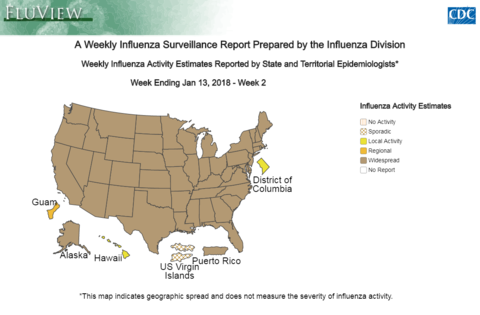In the face of one of the most severe flu seasons in years, doctors must advise patients that it’s not too late to get a flu shot, and if they do come down with the flu, to stay home and avoid spreading the disease.
So far, 30 children in the U.S. have died from the flu this season. Past vaccination trends show that approximately 85% of children who died from influenza did not receive a flu vaccination, Brenda Fitzgerald, M.D., director of the Centers for Disease Control and Prevention (CDC), told Reuters.
Doctors must give patients the same advice as Fitzgerald: Get a flu shot. "My message is, if you haven't gotten a vaccine, please get a vaccine. Also, please get your children vaccinated," said Fitzgerald, who also urges citizens "to take every advantage that you can to protect yourself." The CDC recommends flu vaccination for everyone 6 months of age and older and says flu viruses are likely to continue circulating for several more weeks.
Physicians must also explain to patients that while they’ve likely heard the flu shot is only estimated to be about 30% effective against the H3N2 strain of flu that is dominant this flu season, it has been shown to reduce the severity and duration of illness if people become infected. Fitzgerald told Reuters that reports that the flu vaccine in Australia was only 10% effective may have caused people to think it was not worthwhile to get vaccinated.
The H3N2 strain is an especially nasty flu that in past flu seasons has been linked with severe disease and death, especially in the elderly and young. The CDC has reported that the flu is present in every state and is widespread in every state but Hawaii, according to its latest update.

The CDC also suggests that doctors advise patients who are at high risk of complications to call if they have any flu symptoms, even if they have had a shot. Make patients aware of the importance of antiviral medications to treat flu in people with severe illness and those at high risk. To help avoid illness, people should wash their hands frequently or use hand sanitizer, avoid others who are sick and coughing and use disinfectant wipes.
Influenza (flu) is a serious disease that causes hundreds of thousands of hospitalizations, and tens of thousands of deaths in the U.S. each year. Here’s what to do if you or a loved one becomes sick with #flu this season: https://t.co/CwdNHdnF0M
— Dr Brenda Fitzgerald (@CDCDirector) January 23, 2018
To that end, some doctors use virtual care visits to treat flu patients at home so they don’t infect others, according to Fox6 News. Two hospitals in the Tampa Bay area of Florida—Tampa General Hospital and BayCare—allow patients to receive a diagnosis and prescription without leaving their homes. Using an app, patients can provide information and talk to a physician via phone. Both hospitals offer virtual care to people across the country for about $49 for a visit.
One mother, Jaina Johnson, told the news channel that there was an hour and a half wait at the doctor’s office when she took her daughter there for flu treatment. Waiting rooms of contagious and noncontagious patients were full, she said.
If doctors can’t help via virtual care, patients aren’t charged and are recommended to visit an emergency room or urgent care for in-person treatment.
And doctors and healthcare workers can take their own advice to avoid getting sick while treating sick patients, says ABC 15. Stay up to date on vaccinations, wash your hands frequently and take care of your health, whether it’s steps such as taking vitamins or eating right.